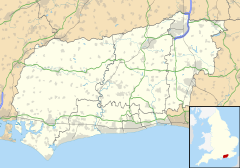Appledram
| Apuldram | |
|---|---|
 Apuldram Church |
|
| Apuldram shown within West Sussex | |
| Area | 4.34 km2 (1.68 sq mi) |
| Population | 169 (2011 Census) |
| • Density | 39/km2 (100/sq mi) |
| OS grid reference | SU842031 |
| • London | 56 miles (90 km) NNE |
| Civil parish |
|
| District | |
| Shire county | |
| Region | |
| Country | England |
| Sovereign state | United Kingdom |
| Post town | CHICHESTER |
| Postcode district | PO20 |
| Dialling code | 01243 |
| Police | Sussex |
| Fire | West Sussex |
| Ambulance | South East Coast |
| EU Parliament | South East England |
| UK Parliament | |
Apuldram or Appledram local /ˈæpəldræm/ is a small parish on the north eastern upper reach of Chichester Harbour about two miles (3 km) south-west of the centre of Chichester in West Sussex, England. Access to the harbour is at Dell Quay.
The nearest railway station is 1.2 miles (1.9 km) northeast of the village, at Chichester.
Most of the parish is farmland, roughly bounded to the north by the River Lavant, to the west by the harbour and to the south by Chichester Marina and the Chichester Canal. The parish is crossed by several public footpaths, offering views of the harbour, Cathedral and South Downs. There is now no village centre and of the original medieval village only the church, the Manor and Rymans now remain.
The area of the parish is 1,073 acres (4.34 km2) and at the 2011 census the population was 169, a reduction of 9% from the 2001 census.
Old records show many different spellings – Apulderham, Apeldreham (1121), Appeltrieham (1198), Appuldram (1440) – but for several centuries the spelling used by the church and the parishioners has been Apuldram. Civic authorities use both 'Appledram' and 'Apuldram' in their records.
W D Peckham is quoted as writing 'the deep loam with a clay or brick-earth subsoil is admirable apple growing land to this day'. However, evidence of when or where in the parish apple farming took place has not come to light – records show grain and, later, wool as the main products of the area. Richard Ratcliffe's history of the parish examines, but does not favour, a suggestion that the name is derived from polder a Dutch word meaning low-lying land protected or reclaimed from the sea, although this would indeed be an apt description of a large part of the parish.
Place names within the parish reflect the industries and activities that once flourished. Salterns Copse, near the Marina, takes its name from the salt pans that were located nearby. Seventeenth century legislation killed off most of the salt industry in Sussex, but Apuldram survived until the middle of the nineteenth century, when free trade laws opened up the market to continental imports.Copperas Point records the production of copperas from iron pyrite.
...
Wikipedia

